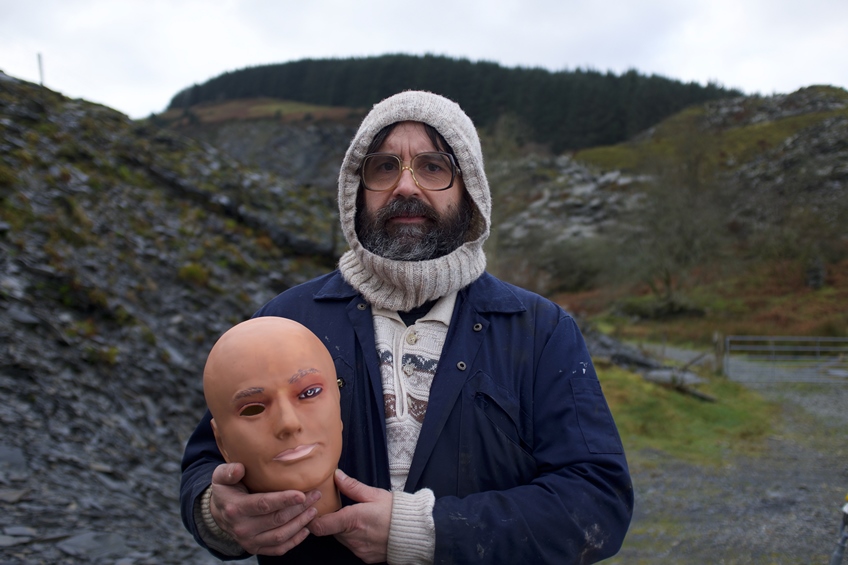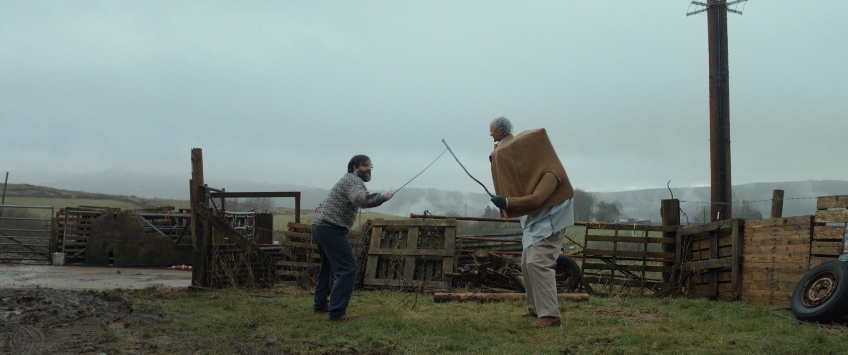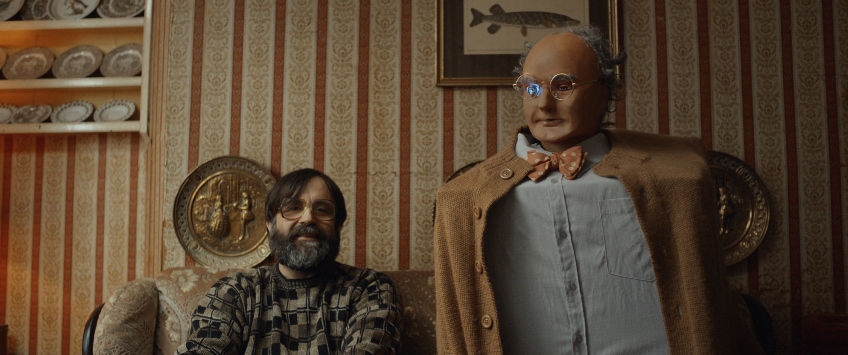Joyce Glasser reviews Brian and Charles (July 8, 2022) Cert PG, 91 mins.
Brian and Charles is a warm-hearted film with a potent message about loneliness, a topical theme after the revelations of Covid and lockdown. Writer-director Jim Archer’s feature film boasts a high concept, too, because the Charles of this buddy movie is a robot, albeit less R2D2 than Frankenstein. Set in a Welsh farming village, the film’s thinly drawn secondary characters and implausible plot development reveal the problems in turning a high concept short into a feature, including the disappearance of a mockumentary director.
Brian (David Earl) is a hirsute middle-aged inventor who lives alone on a ramshackle farm in Wales, using the disorderly house as his home and the barn as his overstuffed workshop. Although Brian is not a farmer, there are a lot of cabbages around which form a bland running joke in the film as they prove useful as sustenance and also defensive weaponry.
When the film opens Brian is blabbing on to a camera-interviewer, presumably Jim Archer, about his lifestyle, and giving us a tour (Hannah Purdy Foggin’s production design deserves special mention) of his workshop. His odd creations range from a pinecone covered bag to a ridiculous flying machine that obviously crashes during a demonstration whose slapstick humour fails.
The interviewer-director, who teaches Brian (who has a TV and can read, so should know better) the term AI, gradually disappears from the film or so it seems. There are a number of scenes in which he could not possibly be present, or the other characters would have commented. It is for the best for the awkward device distracts, rather than adds anything to the film.

Unlike most right minded people, Brian loves a fly-tip. It is while rummaging through one that he finds a trashed washing machine and a handsome male mannequin’s head that become the building blocks to his robot. Not surprisingly, the robot, who, looks like a giant man save for the expressionless face, bulging glass eye, and hard square box for his shoulders and back that protrude through a shirt, does not work.
When Brian returns home from a shopping trip to the village during a thunder and lightning storm, he senses something is amiss. He sees sparks, a light on, hears loud noises and, upon entering the room, realises the clump of disparate materials he had left in a corner of the workshop is wandering around the house. The scene is, of course, reminiscent of Frankenstein, but Archer is not out to scare us.
Brian is not frightened but delighted with the success of his oeuvre who in no time has used the dictionary to teach himself to speak. The fact the robot can speak and has a programmed brain is never explained. Brian claims he toiled for 72 hours to make Charles, which hardly seems long enough to create a cyborg.
Brian sets about giving his new companion a name, although he soon learns that his creation is not going to be named like a baby with no say in the matter. From the start, Charles (Chris Hayward), as they finally agree on, is opinionated. Indeed, the movie’s strength is that Charles, who initially proves a great companion to Brian, sharing in pillow fights and his fondness for cabbage dinners, soon overstays his welcome, like a houseguest whose presence becomes an inconvenience.
For a while, the film is a kind of Home Alone with a child in an adult’s body as he tries to escape the boring village routine that Brian has grown accustomed to. Charles is like a child: stubborn, wilful, demanding, and eager to explore the world while remaining vulnerable and inexperienced in it.
Already considered an eccentric by the indulgent, kindly villagers, and the object of bullying by the film’s villain, a livestock farmer named Eddie (Jamie Michie), Brian is protective of Charles and tries as long as he can to keep his friend hidden.

But when Charles meets withdrawn Hazel (Louise Brealey) who lives alone with her demanding mother, he becomes a matchmaker, taking the first step that self-effacing Brian never dared. The romance between Hazel and Brian is sweet and develops organically, but when nasty Eddie and his spoilt wife and daughters meet Charles, however, we know that big trouble is in store.
Chris Hayward is a terrific foil to Earl’s Brian, a well-spoken gentleman whose accumulation of knowledge outpaces his accumulation of experience. He sees Hawaiian Hula dancers on TV and minutes later is plodding across the moors to Hawaii. He loves people as he has not learnt to fear them, and intuitively invites Hazel along with them on a walk to a lake where Brian seldom visits.
With Brian and Charles Jim Archer places himself in the company of other British filmmakers of homegrown quirky comedies and mockumentaries, like Edgar Wright (Shaun of the Dead) and Ben Wheatley (Sightseers), but without their subversive, black comedy in defined genres. The absence of this element means the film has to be very funny, its characters unique and the plot original to give it substance. Here, Brian and Charles does not always succeed.
Potent as it is, the message about loneliness – Brian does not even realise he is lonely until he creates Charles – is not quite enough for this story to sustain itself as a feature. Hazel, who is a doting and surprisingly adept companion to Brian, is not developed as a love interest, while Eddie is not so stupid that he would commit theft to destroy – rather than profit financially from – Charles.
You wonder, too, since Eddie steals from the local shop as well, why the villagers do not notify the police of this ongoing antisocial behaviour. Brian’s brilliant plot to defeat his adversary and come to the aid of Charles, might humiliate Eddie enough for him to back off, but like Vladimir Putin, you know that any gains will be temporary, and the unbridled bully will always retaliate.




